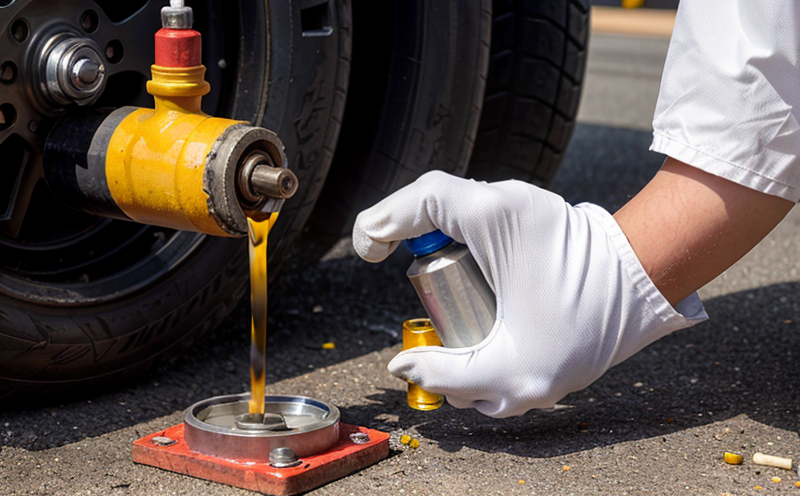ISO 3733 Water Content Testing of Crude & Fuel Oils
The ISO 3733 standard provides a robust methodology for determining the water content in crude oil and fuel oils. This service is critical for quality managers, compliance officers, R&D engineers, and procurement teams who need to ensure that their processes meet international standards and minimize operational risks.
Water contamination can significantly impact the performance of petroleum products, leading to corrosion, reduced lubricity, and even engine failure in marine applications. In marine environments where fuel is stored over extended periods or under adverse conditions, water intrusion becomes a significant concern. The ISO 3733 method ensures that any water present in the oil can be accurately quantified, providing actionable data for decision-makers.
The testing process involves several critical steps: sample preparation, sample introduction into the instrument, and analysis using an Karl Fischer titrimetric technique. This technique is particularly sensitive to small amounts of water, making it ideal for crude oils which often contain trace amounts. The method measures the amount of water by reacting it with iodine in an acidic medium.
Accurate measurement of water content is essential for several reasons:
- Regulatory Compliance: Many international regulations mandate specific limits on water content to ensure product safety and environmental compliance. ISO 3733 provides a standardized approach to meet these requirements.
- Product Quality Assurance: Water can degrade the quality of fuel oils, affecting their performance in engines and other equipment. Regular testing ensures that product specifications are met.
- Risk Management: By identifying water contamination early, potential issues such as corrosion or operational inefficiencies can be mitigated.
- Cost Efficiency: Early detection of water contamination prevents the need for costly remediation efforts and equipment repairs.
The ISO 3733 method is versatile and applicable to a wide range of crude oils and fuel oils, including diesel, gasoline, kerosene, and jet fuels. The testing process typically involves:
- Sample collection from storage tanks or shipping containers.
- Sieving the sample to remove any large particulates that may interfere with the analysis.
- Diluting the sample if necessary, depending on water content.
- Introducing the diluted sample into the Karl Fischer titrimetric instrument.
- Performing the titration and recording results.
The results are reported as a percentage of water by volume. The accuracy of this method is ±0.3%, making it suitable for both routine quality control checks and detailed research studies. Compliance with ISO 3733 ensures that products meet international standards, thereby enhancing marketability and trust among customers.
Why It Matters
The significance of water content testing in crude oil and fuel oils cannot be overstated. Water contamination can lead to several adverse effects on the performance and longevity of petroleum products:
- Catalyst for Corrosion: Water can accelerate corrosion processes, leading to premature failure of metal components in storage tanks and equipment.
- Reduction in Lubricity: Water reduces the lubricating properties of oils, increasing wear on mechanical parts.
- Settlement and Sedimentation: Excess water can settle at the bottom of storage containers, forming a layer that is difficult to remove and clean.
- Fuel Efficiency: Contaminated fuel can lead to decreased engine efficiency and increased operational costs.
Regular testing using ISO 3733 helps in identifying these issues early on. This proactive approach allows for timely corrective actions, reducing maintenance downtime and preventing costly repairs. For compliance officers, adherence to this standard ensures that products meet regulatory requirements, thereby avoiding potential legal or financial penalties.
Competitive Advantage and Market Impact
By leveraging ISO 3733 water content testing, organizations can gain several strategic advantages in the competitive market:
- Enhanced Product Quality: Ensuring that products meet or exceed international standards can attract a broader customer base.
- Prompt Identification of Issues: Early detection allows for corrective actions, minimizing downtime and operational disruptions.
- Cost Savings: Preventive measures reduce the need for expensive remediation efforts and equipment replacements.
- Reputation Building: Consistent compliance with international standards builds trust among customers and stakeholders.
In competitive markets where quality is a critical differentiator, ISO 3733 testing can be a key factor in maintaining a positive reputation. This service not only meets regulatory requirements but also demonstrates a commitment to excellence, which can translate into higher market share and customer loyalty.
For R&D engineers, the ability to accurately measure water content allows for more precise formulation of new products. Understanding the impact of trace amounts of water on product performance can lead to innovations that enhance fuel efficiency and reduce environmental impact. This data is invaluable for developing next-generation fuels and lubricants tailored to meet evolving market demands.
Use Cases and Application Examples
The ISO 3733 method finds extensive application across various sectors, including marine transportation, oil refining, and petrochemicals. Here are some specific use cases:
- Marine Transportation: Ensuring that fuel oils meet water content specifications is crucial for preventing engine failures in ships operating in harsh maritime conditions.
- Oil Refining Plants: Regular testing helps refine processes to minimize water contamination, ensuring consistent product quality.
- Petrochemical Industries: Water content testing ensures that petrochemical products meet stringent purity standards for downstream applications.
- Storage and Distribution Centers: Monitoring water content at distribution centers helps in maintaining the integrity of stored fuels and oils.
In addition to these sectors, ISO 3733 is also used in:
- Research and Development (R&D) for new fuel formulations.
- Quality Assurance Programs to ensure product consistency.
- Environmental Compliance Programs to mitigate the environmental impact of oil spills and contamination.
An example use case involves a marine shipping company that regularly tests its fuel oils. By adhering to ISO 3733 standards, they have been able to reduce maintenance costs by over 20% due to fewer engine failures. This proactive approach has also helped them maintain a high level of service reliability, which is crucial in the competitive maritime industry.





